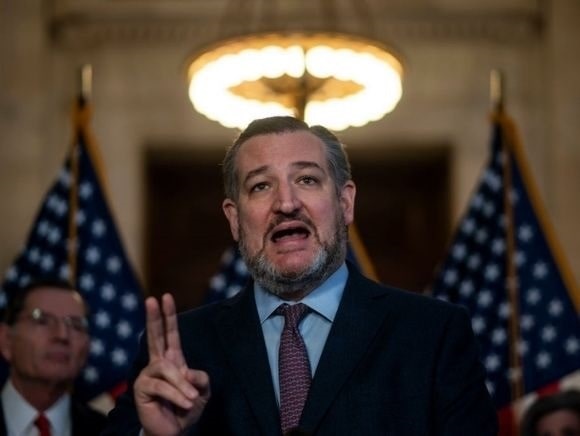Senator Ted Cruz (R-TX) is one of the more outspoken members of Congress’ upper chamber, but he won’t be arguing in the Supreme Court Wednesday morning when Federal Election Commission v. Ted Cruz for Senate is heard. While he’s leaving the oral argument to a seasoned expert, the case itself is his own doing. The issue at the bar concerns restrictions on the repayment of a candidate’s “personal loans” made to fund an election campaign. The legislator thinks this law violates the First Amendment, so he structured a loan with the hopes of reaching the High Court to challenge it. For better or worse, he gets his wish at today’s oral arguments.
I’ll Gladly Pay You Tuesday …

Ted Cruz (Photo by Chip Somodevilla/Getty Images)
When a candidate for federal office lends money to his election campaign, there’s a $250,000 limit on the amount of contributions that the campaign may use to repay the debt – if the funds are received after the election, that is. Furthermore, if a loan over $250,000 isn’t repaid within 20 days after the election, any portion over $250,000 must be converted to a contribution, which isn’t paid back at all. This rule was designed as an anti-bribery measure to prevent those who would buy influence from the winners of elections by easing their debts. It’s simple enough and may be pure of intention, but that doesn’t mean it’s legal.
Cruz says that the First Amendment imposition comes “by substantially increasing the risk that any candidate loan will never be fully repaid—force[ing] a candidate to think twice before making those loans in the first place.” So while the measure might indeed help hamper attempts at undue influence buying, it also prejudices candidates who aren’t as rich as others. Those who can afford to loan more money to fund their campaigns and not care whether it’s ever paid back are in a better position to do so. Consequently, they get more speech than those who can’t afford to not be repaid.
What Are You Going to Do About It?
Mr. Cruz decided to try and change the law – not through legislation and his vote as a senator, but by engineering a fight in the courts. On Monday, November 5, 2018 – one day before the election – Mr. Cruz loaned $260,000 to his election committee. After the 20-day deadline following the election, the committee repaid the legal limit of $250,000. That left $10,000, which was then required to be reclassified as a contribution. Cruz challenged this and won in the lower courts. Now his case is before the Supreme Court, both on procedural and substantive grounds.
SCOTUS took the case to answer the question of whether the dollar limits on loan repayments violate the First Amendment and whether the senator has legal standing to challenge the law in the first place. The Biden Administration argued that, since Cruz and his election committee devised the loan and repayment precisely to challenge the law, no real injury was present. Solicitor General Elizabeth Prelogar wrote in her reply brief that the Court should deny standing because Cruz and the Committee “delayed repayment of the loan, however, not to achieve any campaign-related purpose or to avoid some other harm, but solely to facilitate this lawsuit.”
 Hypocrisy or Bust
Hypocrisy or Bust
It’s hard to understand how that standing argument could pass muster at the Court. So many cases affecting the public interest, including those on abortion, gun control, and free speech, are engineered to receive an audience at the Supreme Court – and a sympathetic one, at that. Big cases seldom arise in some organic fashion without a mind towards advanced appellate review. Former Justice Ruth Bader Ginsberg, for instance, was especially well known and celebrated before she became a Justice for designing litigation to change the law at the Supreme Court.
For the free speech aspect of the case, in what is perhaps the new normal, Democrats and liberals advocate for increased restrictions while conservatives and Republicans become the defenders. Will the High Court grant Sen. Cruz’s committee standing – and if so, will the law as it stands pass muster?
~ Read more from Scott D. Cosenza.




